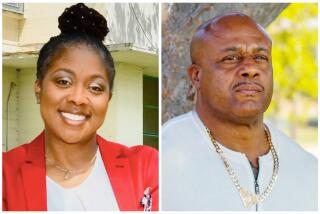Honig Testifies He Saw No Conflict : Trial: Schools chief insists he was unaware of any financial gain in awarding state contracts that involved his wife’s educational consulting project.
- Share via
SACRAMENTO — Schools chief Bill Honig took the witness stand in his defense Monday and insisted that he knew of no conflict of interest in authorizing more than $337,000 in state contracts for local educators to work with his wife’s nonprofit consulting firm.
Faced with four felony counts of conflict of interest, Honig said he was aware of no potential financial gain to Nancy Honig’s Quality Education Project when he authorized three contracts with school districts to pay educators to work on parent involvement programs in the mid- and late-1980s.
“Did you believe that there was any possibility whatsoever that a financial benefit would accrue to QEP?” asked chief defense attorney Patrick Hallinan.
“No, I didn’t,” Honig answered. “I didn’t think there was that possibility.”
Tall and gaunt and wearing a gray sweater under a blue suit, the bespectacled Honig testified before a Superior Court jury that QEP did not profit from the contracts. He said, over repeated prosecution objections, that QEP donated services to school districts and that the schools and children were the beneficiaries of the parental involvement programs.
Under more than an hour of intense cross-examination, Honig stuck to his contention that he saw no conflict of interest in the contracts, but admitted that in 1986 and 1987 he failed to report his wife’s salary on state financial disclosure forms as required by law.
“It was an oversight,” he said.
“A $63,000 oversight?” asked Chief Assistant Atty. Gen. George H. Williamson, referring to Nancy Honig’s 1987 salary from QEP.
Honig denied that he was trying to cover up his wife’s salary, that the state forms were prepared by persons who knew nothing about the contracts and that “we corrected it in 1989.”
Williamson peppered Honig with questions about fund-raising activities on behalf of QEP. The prosecutor repeatedly asked the state superintendent of public instruction whether he had favored his wife’s firm over other organizations that provide parental involvement programs in the schools.
Honig responded often with rambling explanations that brought admonitions from Judge James L. Long, particularly when the schools chief made references to the quality of the programs offered by QEP--a subject ruled irrelevant by the judge.
In earlier testimony, a former QEP executive told the jury that in mid-1988, Linda Page, the prosecution’s star witness, had threatened to “get” Bill and Nancy Honig if Page, a former director of QEP, were forced out of the company.
Margaret Ann Rybicki, former national director of QEP, testified that Page told her: “She (Nancy Honig) better not be trying to cut me out or I will get her and I will get Bill. . . . I can get them. I have ways.”
Rybicki went on to testify that Page had told her: “We don’t need Nancy. We can make a lot of money and market all these ideas ourselves.”
Page has testified in the trial that Nancy Honig said she hoped to save money for QEP through the contacts authorized by her husband. During her testimony, Page denied making any threat regarding the Honigs.
The prosecution contends that QEP was able to prosper from the $337,509 in contracts that paid the salaries of four local educators who worked for QEP to develop parental involvement programs in various school districts.
Documents introduced into court show that Nancy Honig’s salary as president of QEP went from nothing in 1982-84 to more than $100,000 a year by 1991. The Honigs also received rent from QEP for office space in their San Francisco home.
The defense maintains that the money expended under the contracts was used for its intended purpose of paying educators for parental involvement work and that none of the funds benefited QEP or Nancy Honig, whose salary came from private donations.
In another development Monday, the defense was dealt a blow by Long, who denied permission to enter evidence before the jury that Honig had received a lawyer’s advice that it was legal to authorize the three contracts.
Joseph Symkowick, chief counsel for the state Department of Education, had testified out of the presence of the jury last Thursday that he advised Honig’s top deputy, James Smith, that it would be legal for Honig to enter into the contracts. Smith testified that he passed the advice on to Honig.
“Smith failed to provide Symkowick with important facts about Nancy Honig’s activities,” Long wrote in an eight-page decision. “Accordingly, the court finds that Symkowick’s opinion was too general for the defendant to reasonably rely upon it when he acted upon the contracts.”
The jury could begin considering the case next week.
More to Read
Sign up for Essential California
The most important California stories and recommendations in your inbox every morning.
You may occasionally receive promotional content from the Los Angeles Times.













